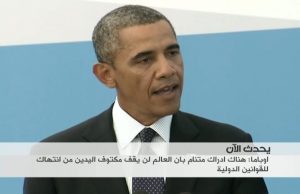BBG Watch Commentary
Despite serious management issues and poor employee morale, especially at the International Broadcasting Bureau (IBB) and the Voice of America (VOA), journalists working for the Broadcasting Board of Governors are indeed doing the best they can to bring uncensored news, information and analysis to many countries without free media.
In addition to the BBG press release, see:
Foreign audiences looking for original Voice of America reports get news analysis from Reuters on VOA’s ‘unattractive’ website, BBG Watch, September 5, 2013.
Pope Francis on Syria – Voice of America website ignores papal statement, BBG Watch, September 5, 2013.
BBG Networks Bring Comprehensive Syria Coverage To The Region And Beyond
Amid rapidly shifting events in Syria and discussion of an international response, the networks of the Broadcasting Board of Governors are bringing much-needed reliable and accurate coverage to audiences in some of the most affected areas.
“In press-restricted countries such as Syria, Iran and Russia, people are left without important information on developments that could severely affect their lives,” said International Broadcasting Bureau Director Richard Lobo. “Our journalists are working hard, and often at great risk, to provide these audiences with the information they so desperately need.”
Alhurra TV was the only Arabic-language network anywhere to broadcast the September 3 Senate Foreign Relations Committee hearing and President Obama’s subsequent remarks with Swedish Prime Minister Reinfeldt in their entirety. Voice of America and Alhurra broadcast live President Obama’s news conference at the G-20 meeting in Russia, as well as Secretary of State John Kerry’s testimony in Congress. VOA’s Persian Service for Iran provided simultaneous translation.
 Alhurra also aired the House Foreign Affairs Committee hearing on Syria, and VOA carried reaction from leading officials, including Senators Ted Cruz, Jeff Sessions, Carl Levin, Bob Corker and Tim Johnson. VOA has also provided comprehensive coverage and reaction from the United States through all of its language services and the newsroom, including correspondents on Capitol Hill, and at the White House, State Department, Pentagon, as well as bureaus throughout the country
Alhurra also aired the House Foreign Affairs Committee hearing on Syria, and VOA carried reaction from leading officials, including Senators Ted Cruz, Jeff Sessions, Carl Levin, Bob Corker and Tim Johnson. VOA has also provided comprehensive coverage and reaction from the United States through all of its language services and the newsroom, including correspondents on Capitol Hill, and at the White House, State Department, Pentagon, as well as bureaus throughout the country
VOA has been closely following worldwide reaction with reports from London, Istanbul, Cairo, Lebanon and elsewhere; Alhurra has examined the response from Syria’s neighbors; and Radio Free Europe/Radio Liberty has reported the “What ifs” of U.S. military response as well as on the potential responses of Syria’s two main allies, Iran and Russia. It also examined a second “red line” – what failure in Syria would mean for the dispute with Iran over its nuclear program.
RFE/RL’s “Where They Stand” info-graphic gives a snapshot of the complex and often contradictory alliances currently at play in the Middle East, and the network has also provided an explanation of what is known about Al-Qaeda’s links in Syria and followed the complicated relationship between Caucasus Islamists and Al-Qaeda-linked Syria rebels.
In addition to reporting on unfolding events, BBG-supported networks are providing valuable expert analysis. Middle East specialist and senior fellow at the Atlantic Council’s South Asia Center Barbara Slavin has contributed exclusive columns to VOAnews.com on diplomatic efforts after a potential U.S. strike and on the political debate inside the U.S. government; Nabil Othman, a UNHCR spokesperson, appeared on Alhurra to talk about how the Syrian refugee crisis is growing. RFE/RL’s Heather Maher examined the legality of a potential strike without approval from the United Nations Security Council.
Journalists supported by the BBG are also bringing accurate reports from inside Syria.In Alhurra’s critically-acclaimed series, Syria Stories, an eye witness and survivor of the August 21 attacks told of how he tried to help as he saw “dozens of children dying before my eyes.” VOA reporter Cecily Hilleary spoke to a Syrian-American doctor coordinating medical workers who had treated some of the victims of the Damascus attack.
Additionally, Alhurra’s magazine program Al Youm (Today) has reported on the deterioration of the Syrian education system. Meanwhile, as RFE/RL’s Heather Maher reports, Syrian President Assad’s wife works to boost the couple’s image via Instagram.
RFE/RL has covered the violence that has spilled into Arab- and Kurdish-populated regions that border Syria and has followed fighters from the Balkans, Kyrgyzstan, Iraqand Turkey who have joined Syrian opposition groups.
The BBG’s networks are also providing important context for their international audiences. VOA’s Persian Service has produced explanatory reports on the War Powers Act, how American domestic politics play into the Presidential decision, and how the American public sees the situation. VOA has examined several different kinds of nerve gas, and Alhurra reported on the effects of chemical weapons on humans with the regional director of Doctors Without Borders. VOA’s Jamie Dettmer compared the 2013 Damascus attack to the 1988 attack on Halabja, Iraq. RFE/RL also created a useful, interactive timeline that provides users with a step by step history of the 30-month-old conflict in Syria.
